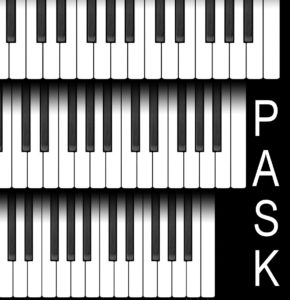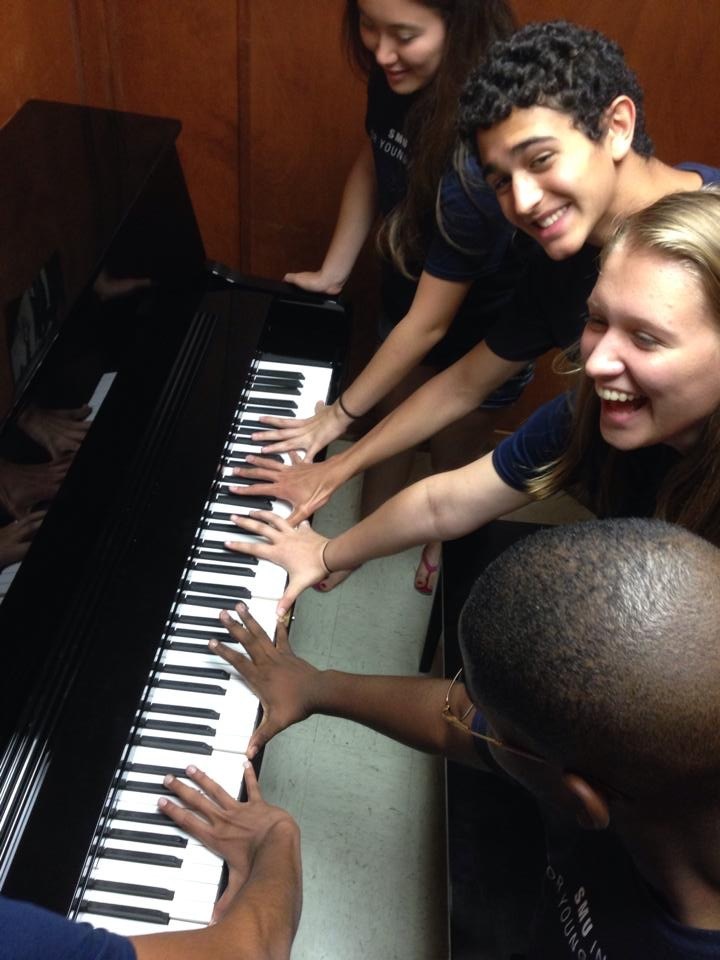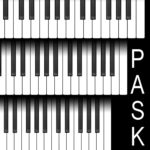What is PASK?
PASK – Pianists for Alternatively Sized Keyboards – is an international movement committed to achieving change in relation to piano keyboard size.
Specifically, PASK aims to convince piano manufacturers to begin producing piano keyboards in three standard sizes. Purchasers of new pianos will then have a choice of keyboard size. In addition to the current ‘large’ size, we need two additional sizes with narrower keys.
Narrower keys in acoustic keyboards that are not consistent with DS sizes have long been available through custom orders, and this option will no doubt continue. PASK supports activities that make use of other keyboard sizes (such as those with octave sizes of 5.9 or 6.2 inches) as the experiences of pianists who play any keys narrower than normal all contribute to our cause.
The current piano keyboard has prevailed since the 1880’s and was not designed for the physical capabilities of the population at large. It has been assumed that the current size is suitable for all, whereas in fact it is isn’t. The keys are too wide for the majority of pianists, considering men, women and children of all nationalities and across all age groups.
The current keyboard size and key width suits people with large hands, generally adult males with average to above average spans. However, for those with smaller hands, today’s piano increases technical difficulties and learning time. It limits musical expression and prevents access to a large amount of the piano repertoire. Worst of all, it can cause debilitating pain and injury.
A simple analogy illustrates the point. Does it make sense that all men in an athletics race should have to wear the same size shoes? And that female athletes have to run in the same size shoes as the men? And that children have to run in the same size shoes as adults?



Goals and strategies
The long term goal of PASK is for acoustic and digital piano manufacturers to offer a choice of three standard keyboard sizes in accordance with the DS standards. These are: DS5.5® and the DS6.0® as well as the current ‘large’ DS6.5 keyboard which has a 6.5 inch (16.5 cm) octave. They need to be mass-produced and marketed worldwide in such a way that the new alternative sizes are readily available and naturally accepted options for all pianists and teachers.
For this to happen, we need to focus on both building the demand from the piano world as well as encouraging supply from manufacturers. Clearly, these are interdependent.
Pianists with smaller hands must create a united voice and demand access to keyboards with narrower keys. Piano teachers, universities and conservatoriums need to recognise their benefits. Competitions and concert venues should provide a choice of keyboard for performers.
Alternatively sized keyboards are currently only available from a limited number of sources, are expensive and often involve long wait times for customers. The major piano manufacturers need to take up this challenge. A key factor in creating change will be public support from prominent pianists, academics and teachers around the world.
There are four main strategies required to achieve this goal:
1. Raising awareness of the benefits of reduced size keyboards for those with smaller hands.
2. Creating opportunities for pianists to experience the difference in playing on narrower keys.
3. Breaking down barriers and resistance to change.
4. Lobbying manufacturers and providing in-kind support to startups and smaller companies.
The website summarises a solid body of evidence of the need for a choice of keyboard size (specifically narrower keys, not fewer keys). It also provides practical information on where pianists can experience narrower keys, current manufacturers, events, media, and links to relevant resources.(6.5 inch
PASK structure and founders
PASK is not a formally constituted organisation, but a network of people working towards a common goal.
There are three founders of PASK:
Ms Erica Booker from Sydney, Australia – Graduate of the New South Wales Conservatorium of Music, pianist and highly respected piano teacher in Sydney. Erica is also a Suzuki teacher trainer and leading advocate for alternatively sized piano keyboards: https://ericabookerpiano.com. She has been involved in peer-reviewed research with Rhonda Boyle (see below).
Dr Carol Leone from Dallas, Texas – Chair of Keyboard Studies at SMU Meadows School of the Arts in Dallas, internationally recognized performing artist, teacher, lecturer, and author. Carol is one of the world’s leading researchers and proponents of ergonomic piano keyboards to promote a pianist’s wellness: www.carolleone.com
Ms Rhonda Boyle from Melbourne, Australia – Former government policy analyst/strategic planner with qualifications in physics, environmental science and urban planning. Rhonda is a pianist, independent researcher and author of peer-reviewed articles relating to hand size and piano playing:
www.linkedin.com/pub/rhonda-boyle/30/931/352. Her research papers can be found here: https://www.researchgate.net/profile/Rhonda_Boyle2. She was listed in the Australian Financial Review’s 100 Women of Influence for 2019. https://www.afr.com/women-of-influence
These three founders have no financial connections with any piano or keyboard manufacturers.
Carol Leone and Rhonda Boyle are both directors of the non-profit DS Standard Foundation: http://dsstandardfoundation.org/
The PASK network is gradually growing and now includes many others around the world who support the PASK goals and who are actively engaged in encouraging change.
If you would like to be an active supporter of PASK, kept up to date on developments, or are interested in investment opportunities with new projects, please be in touch: info@paskpiano.org,
Notes on terminology
Recently, the term ‘stretto pianos’ has become popular in association with the International Stretto Piano Festival. It is a convenient term for any piano or keyboard with keys narrower than the conventional 6.5 inch octave keyboard. ‘Stretto’ means ‘narrow’ in Italian. See: International Stretto Piano Festival and http://strettopianoconcerts.org
Another generic term: ‘narrow keys’ has also become quite common recently, partly due to new products such as the NK5.5 keyboard (http://narrowkeys.com).
The term ‘reduced-size keyboard’ has previously been used in some literature. PASK does not encourage its use as it creates confusion as to what ‘reduced size’ means. Our aim to promote keyboards with 88 keys of normal length, not fewer or shorter keys.
Also note that the DS5.5® is sometimes referred to as the ‘7/8 keyboard’ as the key widths are close to (but not exactly) 7/8 of the ‘standard’ keyboard. Likewise, the DS6.0® is sometimes referred to as the 15/16 keyboard. The ‘DS’ abbreviation stands for Donison-Steinbuhler. Only keyboards manufactured by the DS Standard Foundation, https://dsstandardfoundation.org/ or authorised to use these labels based on defined measurements of key widths, can be referred to as DS® keyboards.
ESPK (Ergonomically scaled piano keyboard) is another generic term, used mostly in the academic community, that also includes keyboards of other sizes, i.e. that do not conform to the DS standards.
The PASK movement (Pianists for Alternatively Sized Keyboards) generally uses the term ‘alternative sizes’, and is now starting to use ‘stretto keyboards’, ‘stretto pianos’ and ‘narrow keys’ as well. So you will find all of these labels used in this website, in view of the fact that people searching for information online may use any of these terms.


